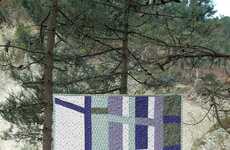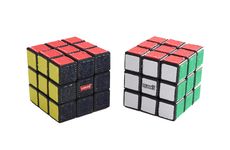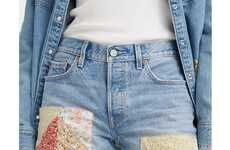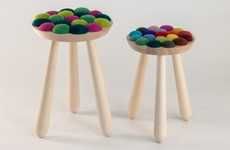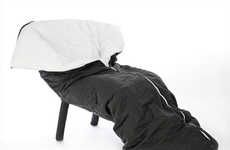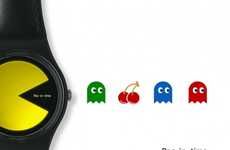
The Levi's 'Made Here' Quilts Are Made From Recycled Levi's and Dockers
Trenton Millar — October 9, 2012 — Art & Design
References: folkfibers & selectism
Levi's 'Made Here' Quilts are the product of a joint venture with Maura Grace Ambrose's quilting company Folk Fibers. This collection of blankets is created using recycled Levi's and Dockers products. Far from looking like an old quilt made of old clothes, Made Here quilts are high-quality and well-designed.
Ambrose makes interesting quilts by experimenting with various traditional Japanese techniques. She also makes dyes from vegetables and uses leather wallets and moccasins in the construction of her quilts. Each quilt comes in a wooden box that is specially made for the Levi's Made Here Quilts series.
The quilts are going to be sold in a limited number of stores, which means that they are a collector's item. Why not pick one up to keep you warm and give you the piece of mind that you are making environmentally conscious purchases?
Ambrose makes interesting quilts by experimenting with various traditional Japanese techniques. She also makes dyes from vegetables and uses leather wallets and moccasins in the construction of her quilts. Each quilt comes in a wooden box that is specially made for the Levi's Made Here Quilts series.
The quilts are going to be sold in a limited number of stores, which means that they are a collector's item. Why not pick one up to keep you warm and give you the piece of mind that you are making environmentally conscious purchases?
Trend Themes
1. Upcycling Textile Waste - Using recycled denim in quilts demonstrates opportunity for upcycling textile waste in creative ways.
2. Combining Traditional Techniques with Sustainable Materials - By combining traditional quilting techniques with sustainable materials, designers can offer unique, eco-friendly products.
3. Limited-edition, High-quality Sustainable Goods - Designing and selling limited quantities of high-quality sustainable goods can create demand and value for environmentally conscious consumers.
Industry Implications
1. Textile and Fashion - The textile and fashion industries can incorporate upcycling into their supply chains, reduce waste, and create value for consumers.
2. Home Decor - Upcycling waste materials can create new opportunities for unique and environmentally friendly home decor products.
3. Gift and Collectibles - Creating limited-edition, high-quality sustainable goods can be marketed to consumers as valuable and unique gifts and collectibles.
3.3
Score
Popularity
Activity
Freshness





